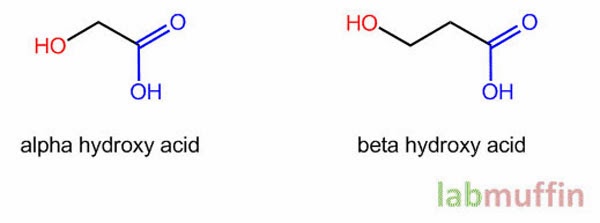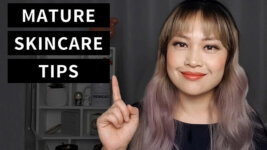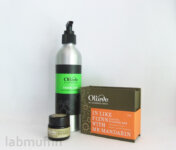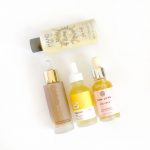Fact-check Feature is a new series here on Lab Muffin, where I’ll be answering beauty questions and busting beauty myths. Got a question? Email me, or leave me a comment.
I’ve heard a lot about sun exposure and chemical exfoliants. What precautions do I need to take?
Chemical exfoliants, unlike physical exfoliants, are products that you leave on your skin. They gradually dissolve the “glue” sticking the dead cells that make up the surface of your skin. While this dead cell layer (the stratum corneum) protects your skin, if it gets too thick, it makes the skin look dull.
The two main types of chemical exfoliants are alpha hydroxy acids and beta hydroxy acids. I’ve discussed the differences between alpha and beta hydroxy acids before – but what about their effects on sun sensitivity?
Unfortunately, there are only a handful of studies out there on the effects of AHAs and BHAs on sun sensitivity.
Alpha hydroxy acids
Glycolic acid is the most studied of the AHAs. Human skin that had been treated with a 10% glycolic acid solution (pH 3.5) daily for 4 weeks was found to have increased redness, DNA damage and sunburn cell formation when exposed to UV light, 24 hours after the last application [1]. However, the sensitivity returned to normal after stopping treatment for a week.
Another study found that glycolic acid also increased the likelihood of developing a tan [2]. Interestingly, a study on mice found that AHAs decrease the formation of tumours after UV exposure [3].
There aren’t many studies on other AHAs, but since they seem to work via the same mechanism, it’s likely that they will affect UV sensitivity in a similar way.
Beta hydroxy acids
Salicylic acid is a different story. Again, there haven’t been many studies yet, but those that exist point to no photosensitisation at the levels used in cosmetics. 4 weeks’ treatment with 2% salicylic acid (pH 3.5) found no increase in sun damage markers 24 hours after the last application [1].
In fact, there are studies which show that salicylic acid, when present on the skin, can act as a sunscreen. People undergoing UVB treatment for psoriasis are told to avoid salicylic acid, since it can block UVB from reaching the skin.
Some salicylic acid derivatives like octyl salicylate are sunscreen ingredients – the salicylate part absorbs UV light and stops it from damaging the deeper layers of the skin.
Bottom line: AHAs increase sun sensitivity, even when they’re not on your skin – slather up with sunscreen! However, they don’t necessarily increase the likelihood of developing skin cancer.
In contrast, salicylic acid doesn’t appear to increase sun sensitivity, and may in fact protect the skin from UV light. But since salicylic acid exfoliation products don’t carry any UV ratings, you shouldn’t rely on them alone for sun protection.
References
[1] A Kornhauser et al., The effects of topically applied glycolic acid and salicylic acid on ultraviolet radiation-induced erythema, DNA damage and sunburn cell formation in human skin, J Dermatol Sci 2009, 55, 10. [open access]
[2] TF Tsai et al., Effects of glycolic acid on light-induced skin pigmentation in Asian and caucasian subjects, J Am Acad Dermatol 2000, 43, 238.
[3] JT Hong et al., Inhibitory effect of glycolic acid on ultraviolet-induced skin tumorigenesis in SKH-1 hairless mice and its mechanism of action, Mol Carcinog 2001, 31, 152.
A Kornhauser, SG Coelho and VJ Hearing, Effects of cosmetic formulations containing hydroxyacids on sun-exposed skin: current applications and future developments, Dermatol Res Pract 2012, doi: 10.1155/2012/710893. [open access]







Super interesting, thanks! I have actually not really given any thought to whether chemical exfoliants would do anything to UV exposure. I generally wear sunscreen all the time anyway, but this is good to know. Shame there’s not more studies though!
xx
Michaela // Where is my mind?
I have a question for you! When you use a gel polish system, there’s a tacky layer of stuff left on your nail after you cure with the UV light. You simply need to remove it with alcohol, but I was wondering, what IS it? It seems a lot like the gel. But if it’s gel, why doesn’t it cure with the light? If it’s not the gel, what is it?
Thanks!
Hmm interesting, I was under the impression that salicylic acid also increased sun sensitivity, so I learned something new! But I guess the moral of the story is that it’s best to apply sunscreen in any case. 🙂
Please write about tretinoin and uv damage too. Thanks. This is good since I use sal acid too.
I have couple og questions
What time is ideal to put on sunscreen if you are staying indoors whole day?
Can I put essence right after putting aha/bha since it is ph dependent?
Thank you 🙂
20 minutes before any sun exposure – so it would depend on if you have any indirect sun exposure.
It depends on a lot of factors – it’s easier just to try both and see which gives you better results.
This is very helpful, thanks! I had read conflicting things about BHAs so I figured it was worth taking precautions just in case. But it’s good to know that my usual daily suncreen use should be sufficient.
Is it not worth using retinoids if I can’t help but get some sun exposure before sunscreening myself? I am not good with mornings and sometimes find myself running to class, etc., already worried about being late (I apply the sunscreen after that). Currently I use 1% retinol and am thinking of getting on Retin-A.
Thanks Michelle. I have a few questions. I’ll just ask them all at once, but I don’t expect an answer to all of them at once.
Is it true that chemical sunscreens get absorbed into your skin & body?
Hair is dead. Can it really be repaired?
Does it matter if the source of rentnol or vitamin C or any other ingredient is manufactured chemically or comes from an organic source & which is better?
Chemical sunscreens can get absorbed but whether that’s a problem is debatable:
https://labmuffin.com/sunscreens-in-your-blood-that-fda-study/
https://labmuffin.com/more-sunscreens-in-your-blood-the-new-fda-study/
Hair repair only really works with some ingredients like Olaplex
https://labmuffin.com/how-does-olaplex-hair-treatment-work/
Doesn’t matter if something is manufactured or organic
https://labmuffin.com/video-natural-beauty-products-better/